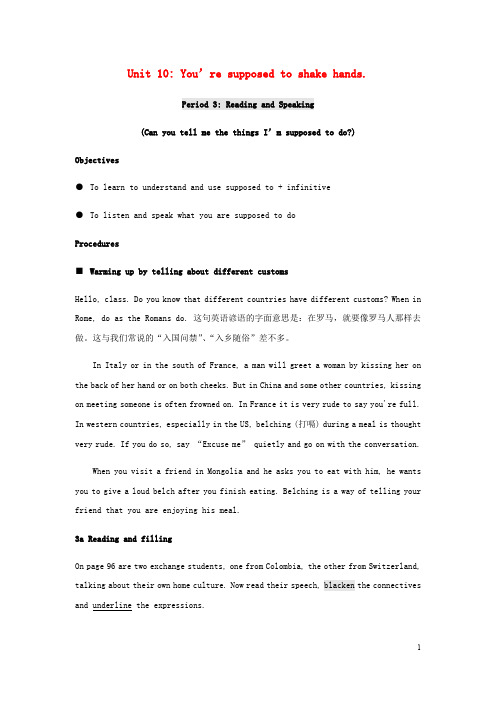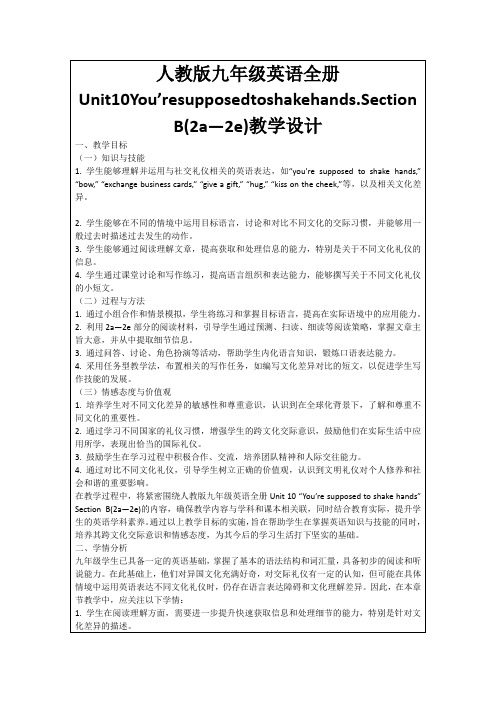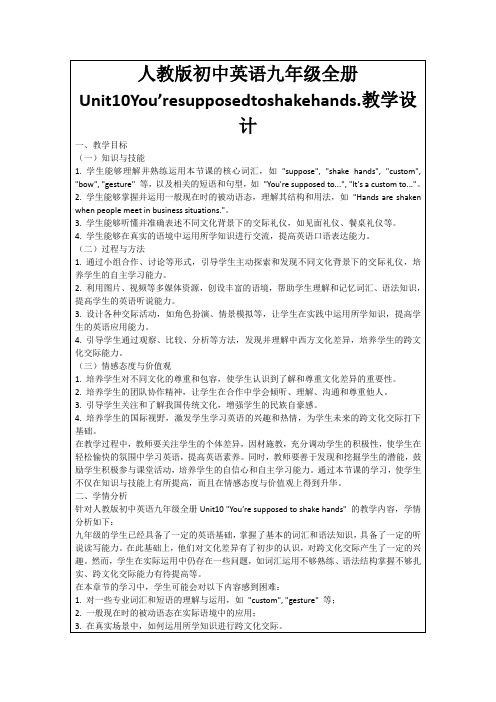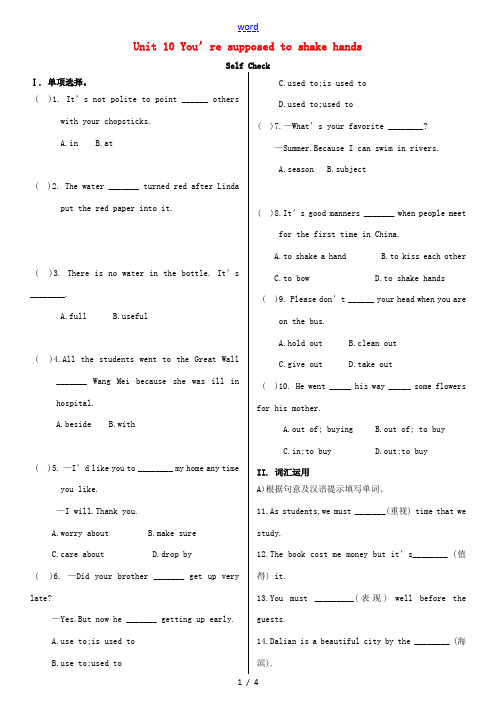九年级英语全册Unit10Youx27resupposedtoshakehands同步练习新版人教新目标版
九年级英语全册 Unit 10 You’re supposed to shake hands Per

Unit 10: You’re supposed to shake hands.Period 3: Reading and Speaking(Can you tell me the things I’m supposed to do?)Objectives●To learn to understand and use supposed to + infinitive●To listen and speak what you are supposed to doProcedures■Warming up by telling about different customsHello, class. Do you know that different countries have different customs? When in Rome, do as the Romans do. 这句英语谚语的字面意思是:在罗马,就要像罗马人那样去做。
这与我们常说的“入国问禁”、“入乡随俗”差不多。
In Italy or in the south of France, a man will greet a woman by kissing her on the back of her hand or on both cheeks. But in China and some other countries, kissing on meeting someone is often frowned on. In France it is very rude to say you're full. In western countries, especially in the US, belching (打嗝) during a meal is thought very rude. If you do so, say “Excuse me” quietly and go on with the conversation.When you visit a friend in Mongolia and he asks you to eat with him, he wants you to give a loud belch after you finish eating. Belching is a way of telling your friend that you are enjoying his meal.3a Reading and fillingOn page 96 are two exchange students, one from Colombia, the other from Switzerland, talking about their own home culture. Now read their speech, blacken the connectives and underline the expressions.And now you are supposed to fill in the chart.3b Pairing and speakingNext you are supposed to role play a conversation between Teresa and Marc, telling about the different attitudes of life in their home countries.4 Pairing and speakingAn exchange student from England is coming to your school for classes. You are supposed to fill in the chart below on page 96 with things he is supposed to do inside and outside the classroom.。
人教新目标 九年级全册英语unit10 You're supposed to shake hands

Unit10 Section B综合能力训练新词对对碰:重点词语达达标I. 根据句意及首字母或汉语提示完成单词。
1.She wants to be an e _____________student to Australia.2.The old man loves his g _____________very much and he often buys gifts for her.3.Everyone else was invited e _____________me, and I don’t know why.4.On the first day, the coach driver taught us some b _____________skills about driving.5.Lin Yue has gradually g _____________used to the life here.II. 根据中文写出单词或短语。
1.使某事感到宾至如归____________2.格外努力____________3.习惯于____________4.值得麻烦____________5.指着____________要点跟踪练:重点知识演练场I. 单项选择。
1.________it’s summer________ winter, Mount Huang is well worth visiting.A.Both; and B.Not only; but also C.Neither; nor D.Whether; or 2.—Do you know when they will hold their wedding party?—No, I don’t. Their wedding date is a ________ and nobody knows it.A.message B.secret C.suggestion D.request3.The teacher's words were encouraging and ________ me, so I decided to plan my life carefullyand have a new start.A.get on well with B.had an influence onC.took pride in D.got used to4.Today many people give out and receive ____________ red envelopes (红包)on mobile phones. A.natural B.electronic C.national D.basic5.—I don’t know what to do. I need some ___________.—No problem.A.information B.advices C.news D.suggestionsII. 从(II)中选择合适的句子补全(I)对话,有两个选项多余。
人教版九年级英语全册Unit10You’resupposedtoshakehands

-定期进行总结性评价,检测学生对本章节知识的掌握情况。
四、教学内容与过程
(一)导入新课
为了激发学生对本节课的兴趣,教师将通过以下方式导入新课:
1.利用多媒体展示不同国家的礼仪图片,如握手、鞠躬、交换名片等,让学生观察并猜测这些行为的含义。
2.邀请学生分享他们在生活中遇到的文化差异现象,引导他们思考礼仪在不同文化背景下的重要性。
(三)情感态度与价值观
1.培养学生对不同文化差异的敏感性和尊重意识,认识到在全球化背景下,了解和尊重不同文化的重要性。
2.通过学习不同国家的礼仪习惯,增强学生的跨文化交际意识,鼓励他们在实际生活中应用所学,表现出恰当的国际礼仪。
3.鼓励学生在学习过程中积极合作、交流,培养团队精神和人际交往能力。
4.通过对比不同文化礼仪,引导学生树立正确的价值观,认识到文明礼仪对个人修养和社会和谐的重要影响。
2.撰写一篇关于文化礼仪的小短文,可以选择一个你感兴趣的国家,描述其特有的礼仪习惯,要求运用一般过去时,不少于100词。
3.观看一部与国际文化交流相关的纪录片,记录下至少五个与礼仪相关的场景,并分析其文化背景,下节课与同学分享。
4.家庭作业:与家长一起探讨中国的传统礼仪和现代礼仪,了解它们在生活中的应用,并以图文并茂的形式展示出来。
2.在语言表达方面,学生需要加强一般过去时的运用,以及在实际场景中恰当使用目标语言进行交际。
3.情感态度上,学生可能对某些文化礼仪存在误解,需要引导他们树立正确的价值观,增强跨文化交际意识。
针对以上学情,本章节教学应注重激发学生的兴趣,以实际案例为切入点,引导他们主动参与课堂讨论,提高英语应用能力。同时,关注学生的个体差异,提供个性化指导,帮助他们克服语言障碍,提升文化素养。通过这样的教学策略,使学生在掌握学科知识的同时,培养其国际视野和跨文化交流能力。
九年级英语全册 Unit 10 You’re supposed to shake hands gra

You’re supposed to shake hands教学目标知识与技能:1.学习掌握下列词汇:drop by, after all, get mad, make an effort2.复习be supposed to句型。
3.掌握be supposed to, be expected to, be important to的句型。
过程与方法:训练法,熟能生巧法,通过练习巩固复习所学知识。
情感态度价值观:建立对英语学习的自信心,激发学生对英语学习的兴趣。
教学方法教师引导,学生自主探究,小组合作学习方法自主探究与小组合作相结合。
教学准备ppt,多媒体。
教学过程设计意图Step 1 GreetingsGreet the students as usual.Step 2 Grammar Focus1. 学生阅读Grammar Focus中的句子,然后做填空练习。
1) 你第一次遇到某一个人应该做什么?_______ ______ you ______ ______ ______ when you meet someone for the first time?2) 你应该握手。
You _______ _______ ________ ________ _________.3)你不应该亲吻。
You ________ ________ _______ kiss.4) ---你应该什么时候到?---我应当7点钟到。
---When were you ________ _______ _________?---I _______ ________ ______ _______ at 7:00.5) ---我应该穿牛仔裤吗?Ma ke students be aware of the usage of “be supposed to” .---不应该穿,希望你穿西服打领带。
---__________ I ________ _________ wear jeans?---No, you _______ ________ _______ wear a suit and tie.6) ---让别人一直等不礼貌吗?---对,让别人一直等不礼貌。
人教版初中英语九年级全册Unit10You’resupposedtoshakehands

一、教学目标
(一)知识与技能
1.学生能够理解并熟练运用本节课的核心词汇,如"suppose", "shake hands", "custom", "bow", "gesture"等,以及相关的短语和句型,如"You're supposed to...", "It's a custom to..."。
4.教学评价:
-教师采用多元化的评价方式,如课堂表现、作业完成情况、实践活动参与度等;
-学生参与评价,反思自己的学习过程,提高自我监控和自主学习能力;
-教师根据评价结果,调整教学策略,以提Biblioteka 教学质量。四、教学内容与过程
(一)导入新课
在这一环节中,我将通过以下步骤引导学生进入新课的学习:
1.利用多媒体展示不同国家的见面礼仪图片,如中国人握手、日本人鞠躬、西方人拥抱等,激发学生的好奇心。
-一般现在时的被动语态的构成和用法;
-不同文化背景下的交际礼仪知识。
2.难点:
-在实际语境中灵活运用核心词汇和短语;
-准确运用一般现在时的被动语态进行表达;
-理解并尊重不同文化背景下的交际礼仪,进行有效的跨文化交际。
(二)教学设想
1.课前准备:
-教师准备相关的图片、视频等多媒体资源,以便在课堂上创设丰富、真实的语境;
(二)过程与方法
1.通过小组合作、讨论等形式,引导学生主动探索和发现不同文化背景下的交际礼仪,培养学生的自主学习能力。
2.利用图片、视频等多媒体资源,创设丰富的语境,帮助学生理解和记忆词汇、语法知识,提高学生的英语听说能力。
九年级英语全册 Unit 10 You’re supposed to shake hands Sel

wordUnit 10 You’re supposed to shake handsSelf CheckⅠ. 单项选择。
( )1. It’s not polite to point ______ others with your chopsticks.A.inB.at( )2. The water _______ turned red after Linda put the red paper into it.( )3. There is no water in th e bottle. It’s ________.A.fulleful( )4.All the students went to the Great Wall _______ Wang Mei because she was ill inhospital.A.besideB.with( )5. —I’d like you to ________ my home any time you like.—I will.Thank you.A.worry aboutB.make sureC.care aboutD.drop by( )6. —Did your brother _______ get up very late?—Yes.But now he _______ getting up early.e to;is used toe to;used toed to;is used toed to;used to( )7.—What’s your favorite ________?—Summer.Because I can swim in rivers.A.seasonB.subject( )8.It’s good manners _______ when people meet for the first time in China.A.to shake a handB.to kiss each otherC.to bowD.to shake hands( )9. P lease don’t ______ your head when you are on the bus.A.hold outB.clean outC.give outD.take out( )10. He went _____ his way _____ some flowers for his mother.A.out of; buyingB.out of; to buyC.in;to buyD.out;to buyII. 词汇运用A)根据句意及汉语提示填写单词。
- 1、下载文档前请自行甄别文档内容的完整性,平台不提供额外的编辑、内容补充、找答案等附加服务。
- 2、"仅部分预览"的文档,不可在线预览部分如存在完整性等问题,可反馈申请退款(可完整预览的文档不适用该条件!)。
- 3、如文档侵犯您的权益,请联系客服反馈,我们会尽快为您处理(人工客服工作时间:9:00-18:30)。
Unit10 You're supposed to shake hands一、单项选择(共20小题;共20分)1. You're supposed your room up before you go out.A. to cleanB. cleanC. cleaning2. Listening to the music always makes me .A. relaxed; relaxingB. relaxed; relaxedC. relaxing; relaxingD. relaxing; relaxed3. My parents and teachersalways me progress. So I have to work hard.A. hope; to makeB. wish; makeC. expect; makeD. expect; to make4. It's fun a birthday card for your friend.A. makesB. makeC. to makeD. to making5. It's possible for ordinary people on the moon in the nearfuture.A. walkB. to walkC. walkingD. will walk6. --- I am sorry I didn't do a good job.--- Never mind. , you have tried your best.A. Above allB. In allC. At allD. After all7. Hong Kong Disneyland is well worth .A. to visitB. visitingC. visitD. visited8. I used to eat a lot in the morning. However, I used toeating anything now because I always sleep late.A. don'tB. didn'tC. haven'tD. am not9. You can come to visit me every day Tuesday. I will go outfor dinner that day.A. exceptB. expectC. besidesD. beside10. China is making great efforts the traditional culture.A. to developB. developingC. developedD. develop11. --- Oh, my god! I'm late for school.--- You get up at six.A. supposedB. supposed toC. were supposed toD. were supposed12. --- Did you enjoy the concert last night?--- Not very much. The soft music made me . I soon fell asleep.A. excitedB. relaxedC. surprisedD. interested13. What present do you expect your father for you?A. buyB. is buyingC. buyingD. to buy14. It's dangerous a close look at the tiger in the zoo.A. for us takingB. of us to takeC. of us takingD. for us to take15. It is a shame such a mistake.A. makeB. to makeC. makingD. made16. You should praise your son. , he works harder than before.A. After allB. Above allC. As a resultD. First of all17. The shoes were worn out, what's more, they aren't worth .A. to mendB. mendingC. mendedD. for mending18. Mary is used to a T-shirt and jeans.A. wearB. put onC. wearingD. putting on19. This is a good composition several grammar mistakes.A. exceptB. except forC. besidesD. beside20. --- Many people are worried that so many college graduates each year can'tfind a job.--- There is no need to worry about it as the government is now making every to provide more jobs.A. effortB. effectC. measureD. action二、单词拼写(单句首字母填空)(共10小题;共10分)21. Walking on the beach makes you feel r .22. When you g someone, you say "Hello" or shake hands with them.23. The dictionary that my father bought for me many years ago is still of greatv .24. It's bad m to interrupt other people while they are talking.25. She wanted to e the blouse, because it didn't fit.26. As a gentleman, you should learn how to b at the dinner table.27. --- Can you give me some s on learning English?---Yes. Read English magazines, and...28. Listening, speaking, reading and writing are four b skills of English learning.29. He goes to work every day e Monday.30. In 1938, Bethune went to n China, as he knew many people weredying in the war.三、单词拼写(根据中文提示拼写单词)(共10小题;共10分)31. There are some (交换) students from Beijing Sunshine Secondary School in our school this term.32. I like soft music. It always makes me (轻松的).33. Why didn't you (敲) at the door before you came in?34. You must take your (护照) when you go abroad.35. He is from (东部的) Africa.36. Different people from different places have different (风俗习惯).37. The (用途) of regular exercise should not be underestimated(低估).38. She (表现) very badly at the party last night.39. He sometimes makes a helpful (建议).40. You should make your dream come true through your own (努力).四、翻译(根据中文提示完成句子)(共10小题;共20分)41. 我们理应彼此帮助。
We each other.42. 即使你和朋友在一起,在公共场合最好也要控制你的音量。
(keep)(词数不限)Even if you are with your friends, it is better in public places.43. 他正在努力学习数学。
He is to study math.44. She very me when I was late. (对我大发脾气。
)45. I am gradually (习惯于吃) with chopsticks and spoon.46. 他总是不怕麻烦地帮我摆脱困境。
(词数不限)He always his way to help me out.47. The story book is (值得看).48. 当你去拜访朋友,进入他家之前,你应该先脱鞋。
When you visit a friend, you should your shoes before entering his home.49. 你应该找份兼职以多赚点钱。
(词数不限)You to find a part-time job to earn more money.50. 在考试中关注细节,我们取得好成绩并非难事。
It's not difficult for us in the test paying attention to the details.五、完形填空(共10小题;共15分)When in Rome, do as the Romans do. Before going to a new place, learn itsmanners and 51 there. In this way, we won't be 52 . But good manners are different in different places. In Japan, it's polite to take off shoesbefore 53 houses. In France, however, it's not 54 even if your shoes are dirty. 55 in Malaysia don't finish their drink. Instead, theyleave a little to show the hosts that he has enough. When greeting others, peoplein England 56 expressions like "Hello!" or "Fine weather!". But people inChina usually 57 "Have you eaten?" or "Where are you going?" You know, we58 are always considered to be warm-hearted and care a lot about others.People all over the world 59 that a person with good manners iskind and helpful to others. We will not behave badly 60 we can understand and remember all these. Polite people are welcomed wherever they go.51. A. customs B. signs C. activities D. languages52. A. lazy B. lost C. rude D. lucky53. A. buying B. entering C. renting D. sweeping54. A. natural B. perfect C. obvious D. necessary55. A. Guests B. Drivers C. Patients D. Friends56. A. tell B. say C. set D. use57. A. act B. ask C. show D. think58. A. Chinese B. Japanese C. Frenchmen D. Englishmen59. A. reply B. argue C. agree D. wonder60. A. if B. so C. unless D. because六、阅读理解(共16小题;共32分)AWe saw an interesting documentary some days ago. It tells that before yougo to another country, it is a great help if you know the language and some of thecustoms(习俗) of the country.When people meet each other for the first time in Britain, they say “Ho w do you do?” and snake hands. Usually they do not shake hands after they haven'tmet for a long time or when then they will be away from each other for a long time.Last year a group of German students went to England for a holiday. Their teachertold them that the English people hardly shake hands. So when they met their English people hardly shake hands, so when they met their English friends at thestation, they kept their hands behind their backs. The English students had learned that the Germans shake hands as often as possible, so they put their handsin front and got ready to shake hands with them. It made both of them laugh.61. It is if you know the language and some customs of thecountry you want to go to.A. not usefulB. not helpfulC. very helpfulD. very sad62. English people usually shake hands when they .A. meet every timeB. meet for the first timeC. say goodbye to each otherD. say hello to each other63. Usually English people don't shake hands .A. when they won't be away for a long timeB. when they say “How do you do?”C. when they meet each other for the first timeD. after they haven't met for a long time64. Which is RIGHT?A. German people shake hands as often as possible.B. English people like shaking hands very much.C. German people hardly shake hands.D. Neither English people nor Germans like shaking hands.65. This passage is about .A. shaking handsB. languagesC. customsD. languages and customsBIf you are in America or go to American families to have meals, you shouldlearn some table manners. Here are some tips:Don't circle your plate with your arms. If you do so, you will become thefocus(焦点) of the table. Everyone would wonder, "Is there anything wrong with thefood?" This may give a wrong message that you don't like the food or something like that.Don't push the plate back when finished, leave it where it was. Do you want to let the hostess know that you've just done a labor?Don't lean(倚靠) back and say "I'm through" or "I'm full". Just put thefork and knife across the plate. That's all.Don't cut up everything before you start to eat. Cut only one or two bites(块) at a time.Never take a huge mouthful of anything. Do you want to show how hungry youare? Don't do that. It's not so good.It's never good to reach across the table for anything. If the thing youwant is not at hand, simply ask the nearest person for help, like "Mrs. Smith, could you pass me the dish?"66. According to the passage, which of the following is WRONG?A. Leave the plate where it was when finished.B. Cut up one or two bites before you start to eat.C. Push the plate back where it was.D. Don't take a huge mouthful of anything.67. After finishing dinner, you should .A. put the fork and knife across the plateB. stand up and leave the tableC. say "I'm full"D. say "Thank you"68. If you want a dish far from you at table, you should .A. ask the nearest person for helpB. leave your seat to get itC. sit there until others help youD. stand up and reach across the table for it69. If you are at table and circle your plate with your arms, other people willthink .A. you don't like the foodB. the food isn't good for youC. there is something wrong with the foodD. all above70. Which can be the best title for this passage?A. How to Behave in America?B. Table Manners in AmericaC. What you Can Do in America?D. Table MannersCKnowing how to ask for information and help politely is important.In English, "Where are the restrooms?" and "Could you please tell me where the restrooms are?" are similar requests(请求) —both are correct English,but the first could sound rude. It's important to use correct language, but sometimes this alone is not enough—we need to learn how to be polite when we make requests.In English, just like in Chinese, we change the way we speak when talkingwith different people. The expressions you use might depend on whom you are speaking to or how well you know them. If you say to your teacher, "Where is mybook?" this will sound rude. But if you say "Excuse me, Mr. West. Do you know where my book is?", your question will sound much more polite. On the other hand,it might be alright to say "Where is my book?" to the people you know well.And you would not usually say "Peter, lend me your pen.". A very direct order like this can sound rude in English. Usually in English polite questions arelonger and include extra(附加的) language, such as "Could you please...?" or "CanI ask...?". It sounds more polite to say "Peter, could you please lend me your pen?". If you stop a stranger in the street, we might first say "Excuse me. I wonder if you can help me." or "I'm sorry to trouble you but…" before asking himfor help.It might seem that speaking politely is more difficult than being direct,and in a way this may be true.71. When we make requests, we need to speak in a way.A. politeB. carefulC. differentD. direct72. You should say " " when you ask a stranger for a way.A. Which is the way to the zoo?B. How can I get to the zoo?C. Do you know the way to the zoo?D. Excuse me. Can you tell me the way to the zoo?73. Which of the following is true according to the passage?A. We should use long sentences when we ask for information and help.B. When we ask for help from others, polite language must be used.C. The way of speaking is important when we ask different people for help.D. In English, polite questions are as necessary as rude and direct ones.DSpending two or three hours playing outdoors each day can reduce a child'schance of becoming short-sighted, a research shows. It challenges(挑战) the beliefthat short-sightedness is caused by computer use, watching TV or reading in weaklight.The Australian government researchers believe that sunlight is good for people's eyes. They compared the vision(视力) and habits of 100 seven-year-old children in Singapore and Australia. In all, 30% of the Singaporean children wereshort-sighted—this rate(比率) was ten times higher than Australian children.Both groups spent a similar amount of time reading, watching television and playing computer games. However, the Australian children spent an average(平均) of two hours a day outdoors—90 minutes more than the Singaporean children.Professor(教授) Ian Morgan, from the Australian Research Council's VisionCentre, said, "Humans are naturally long-sighted, but when people begin to go toschool and spend little or no time outdoors, the number of short-sighted people gets larger. We're also seeing more and more short-sighted children in cities allaround the world—and the main reason may be that city children spend less time outdoors."Daylight can be hundreds of times brighter than indoor light. But why doesplaying outside prevent us from becoming short-sighted? Scientists believe that natural light has a special chemical(化学物质) which stops the eyeball from growing out of shape and prevents people becoming short-sighted.So be outdoors. It doesn't matter if that time is spent having a picnic orplaying sports.74. How much time did the Singaporean children spend outdoors on average every dayin the research?A. 2 hours.B. 90 minutes.C. 1 hour.D. 30 minutes.75. What is the fifth paragraph mainly about?A. Why people become short-sighted.B. Why natural light has a special chemical.C. Why playing outside is good for one's eyesight.D. Why daylight is much brighter than indoor light.76. Which of the following is true according to the passage?A. People will all become short-sighted after they begin to go to school.B. Playing outdoors for 2 or 3 hours every day can help protect your eyesight.C. Children in Australia are more likely to get short-sighted than those inSingapore.D. If you spend two or three hours playing outside each day, you won't getshort-sighted.七、短文7选5(5选5等)(共5小题;共10分)The Secrets of Happiness77. Money and success alone do not bring lasting(长久的) happiness. Happiness depends on ourselves. In other words, we make our own happiness. Here are a few suggestions to help you be happier.78. Too often, we spend so much time thinking about thefuture for example, getting into college or getting a good job—that we fail to enjoy the present(现在). You should enjoy life's simple pleasures, such as readinga good book, listening to your favorite music, or spending time with close friends.79.Another secret to leading a happy life is to be active, and have hobbieswhere you forget your problems. Many people experience this dancing, or playing asport, such as skating or soccer. 80.Finally, many people find happiness in helping others. According to studies, people feel good when they volunteer their time to help others.81. You can help a friend with his or her lessons, go shopping tobuy food for your family members, or simply help out around the house by washingthe dishes.A. The second secret of happiness is to do more exercise.B. If you want to feel happier, do something nice for someone.C. People who have brothers and sisters are happier than others.D. The first secret of happiness is to enjoy the simple things in life.E. Most people want to be happy, but few know how to find happiness.F. People who have several close friends live happier and healthier lives.G. You can forget about your problems, and only think about the activity.八、阅读与表达(问答式)(共5小题;共10分)Ma Hua graduated from Fudan University. He had a good career in IT and agreat life in Shanghai, but he felt there was something missing from his life. Hewanted to help others to improve their lives, so in March 2003 he gave up his job.Then he moved to south-west China to do voluntary work in a village primary school.He soon became an important member of the local people. In his class, hepainted pictures on the walls to help students remember English words. He also spent his money building a playground for the children.Ma Hua quickly got used to his new life. He got great satisfaction fromhis work and felt very happy, even though life there was hard—he had to melt(融化) ice for water and grow vegetables for food. When he was free, he wrote poems describing the peace and beauty around him. Sometimes he would go walking in themountains and enjoy the beautiful view.Sadly Ma Hua was killed in a car accident in July 2004 at the age of 31.His death was a great loss to all those who knew him, but it is a comfort to knowthat he lived happily, doing what he loved and enriching the lives of others.82. When did Ma Hua give up his job in Shanghai?83. What did Ma Hua build for the primary school children?84. Did Ma Hua enjoy his life in the village?85. What did Ma Hua do in his free time? Give ONE example.86. What can we learn from Ma Hua?答案一、单项选择1. A2. D3. D4. C5. B6. D7. B8. D9. A 10. A11. C 12. B 13. D 14. D 15. B16. A 17. B 18. C 19. B 20. A二、单词拼写(单句首字母填空)21. relaxed22. greet23. value24. manners25. exchange26. behave27. suggestions28. basic29. except30. northern三、单词拼写(根据中文提示拼写单词)31. exchange32. relaxed33. knock34. passport35. eastern36. customs37. value38. behaved39. suggestion40. effort四、翻译(根据中文提示完成句子)41. are supposed to help42. to keep your voice down/to keep down your voice43. making an effort44. got; mad at45. used to eating46. goes out of47. worth reading48. take; off49. are supposed50. to make good grades; after五、完形填空51. A 52. C 53. B 54. D 55. A56. D 57. B 58. A 59. C 60. A六、阅读理解61. C 62. B 63. D 64. A 65. C66. C 67. A 68. A 69. D 70. B71. A 72. D 73. C 74. D 75. C76. B七、短文7选5(5选5等)77. E 78. D 79. F 80. G81. B八、阅读与表达(问答式)82. In March 2003.83. He built a playground for the primary school children.84. Yes, he did./Yes.85. He wrote poems describing the peace and the beauty around him. / He would go walking in the mountains and enjoy the beautiful view.86. We should try to help others like him.。
